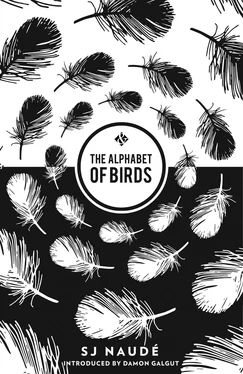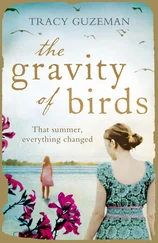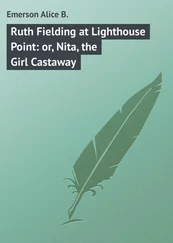At first she remains standing stiffly in the door, then she sits down. There are four of them: she, Kobus and a blurry face underneath each of them reflected in the shiny wood.
‘So, you made your choice,’ he says hopefully, but without conviction. ‘You’ve selected one.’
For a long time she does not answer.
‘When Grace goes,’ she says, ‘I’ll be bringing the entire district’s orphans to Helpmekaar. Not one will be left behind.’
Kobus moves his hands, sits back. For a while he says nothing.
‘There is only one way for us to afford that. To make it possible for us to ultimately stay here at all. You know that.’
Back at Helpmekaar, Sandrien sends Brenda away and injects Grace with morphine. She flattens the blanket with her hand, feels the shape of the arid landscape underneath. She imagines a granite lid weighing down on Grace’s face, resting on the brittle tips of her cheekbones. She averts her face, leaves the room. She wanders through the interconnected rooms as if over a wide plain, ending up back at Grace’s bedroom door. She looks at the ampoules on the bedside table, feels the veins in her own arm.
She sits down on one of the benches on the veranda, back against the wall. Her parents built this house, this veranda with its ironstone pillars. A dry wind starts blowing. On the bench next to her there is a movement, a rustling. She cannot see her — there is only a dark hollow — but she knows it is Ma Karlien. A few swallows slip by.
‘I guess I should say sorry, Ma.’ It sounds as if she is speaking into ice. ‘I forsook you, let you waste away alone in this ramshackle place.’
The wind blows in dark gusts through the garden.
Sandrien holds out her hands, palms up. ‘What I can say is that I tried to be of service with these hands. Look: the skin is rubbing off my palms. I am becoming dust.’
Her mother is sitting too far away, in a vacuum over there.
‘Here come the swallows now,’ she hears her mother sigh. And so it happens. The black birds swerve between the pillars, skim along the veranda ceiling and back out. Swish-swish, they sweep, and their numbers increase, time after time they come, half-possessed, in and through and out and back.
Her voice is hoarse, the dust has settled in her throat. ‘I have to go, Ma. Perhaps the birds have come for Grace.’
But there is nothing. The birds have gone. And it is Ma Karlien who has gone with them.
Inside she bends over the bed, her ear against Grace’s lips. Her breathing is shallow but regular.
In the kitchen she stands in front of the sink. She smells the thinly worn bar of Sunlight soap and the evaporated staleness from the drain. Her skin crawls. She is occupying the same space as the ghosts of maids who have washed their hands raw here over the years — the maids from her childhood, those of Ma Karlien later. In vain she searches for faces in the windowpane above the sink — faces as worn as the bar of Sunlight soap. Grace’s is the only one that appears. She hopes they can forgive her, the ghost-maids and Ma Karlien.
Sandrien keeps a keen eye on the black windows as she wanders through the house, through the chain of rooms, around and around. Thanks to the game farms, so many predators live in the hills these days. Out there, beyond the circle of light, they are already lingering, their saliva like diamonds in the dark. Perhaps she should drag a bench in front of the veranda door and keep watch. One cannot be too careful. If they want to get in, they will have to eat through her first.
But when the weight of granite settles in her mind again, she knows: it is time. Yes, she will pre-empt the predators. She will lift the body from her mother’s bed, the body that no longer belongs to Grace. And when she walks out of here (inching her way along, not to scare away the beasts), it will lie lightly on her hands. She will stretch out her arms to the edge of the light, where the yellow eyes dart, and offer what remains.
‘Here,’ she will say, ‘I know you are waiting for us; here she is at last.’
It will be swift, the cleaning up. Just a little bag of snapping bones.
She walks out on the veranda, notices the distant lights of a convoy of vehicles — nocturnal hunters with infrared visors. She rubs her knuckles raw against the ironstone. With a flash of the hand she will summon them tonight: an army of ghosts, ready for battle.
Shortly before his mother’s death he sees her naked for the first time in his life.
He enters the bedroom. The bathroom door has been left open, in case she should fall or lose consciousness. It frames her: the body shapeless, the small towel she quickly presses against herself too small to cover her lower abdomen. Each pubic hair with a drop of clear water clinging to the tip. They both look away. Later they pretend it never happened.
Let’s first go back in time, a few months, to where he is standing, halfway down the cellar stairs, looking up at Joschka. Joschka is hesitant, calling him back, a large old-fashioned key in his hand. They are staying at Joschka’s brother-in-law’s castle, Burg Heimhof, in the Oberpfalz, not far from Nuremberg.
The castle sits on a rocky promontory, overlooking a quiet little Bavarian valley through which a Harley Davidson roars once or twice a day. The castle has a waterless moat on one side; on the other side it overlooks the edge of the cliff. The moat is overgrown and scattered with rubble. There is an eighteenth-century gate with metal-plated doors and ornamental carpentry. The part of the castle in which they are standing dates from the eleventh century. It is five storeys high. The oak floors have partially collapsed. The stairs, too, are broken off in places: as you ascend, they suddenly vanish. If you look down, you can see through three floors, all the way to the stairs descending to the cellar. If you look up, there are pigeons beneath heavy beams, light radiating through holes in the roof. The broken lines of the floors and stairs and beams form a three-dimensional diagram, an optical illusion. It is hard to get a grip on scale. Through openings in the wall you can see fragments of the valley and surrounding hills and forests, the hamlet at the foot. On the metre-wide sills there are birds’ nests.
Joschka’s brother-in-law, whose parents bought this castle from the German government for a song shortly after the war, has been restoring one room on the middle floor for decades. Painfully precise: wall paintings of knights and unicorns, floors and ceilings of reclaimed Southern German oak, torches on the walls. A knight’s armour stands in the corner with a lance clutched in the gauntlet. You could imagine that he is still in there.
A strange sensation: standing in a beautiful room, but when you open a door, you are in a ruin.
Or let’s go back a week further. Berlin. They are staying with Joschka’s friends Aarik and Wilfred in Kreuzberg. Joschka lived in Berlin for a few years before moving to London, where they met. It is Joschka’s opportunity to show him his Berlin, everything from the sublime to the abject. Mostly the abject.
On the first evening there, they go out on the town. They move from bar to restaurant to party to bar to party to underground event to nightclub. They meet friends of Joschka’s, and acquaintances. And friends and acquaintances of friends and acquaintances. Joschka snorts too much cocaine in toilets. He moves with purpose, as if heading somewhere, as if his feet are lifting off the street. There are taxis, long walks through wide streets, lifts in speeding cars. From Kreuzberg to Schöneberg to Mitte, to Prenzlauer Berg and back to Mitte. They join people and take their leave, meet and move on: a night of greeting and departure, of random trips and changes of direction. He drinks too much himself, swallows or snorts things he is offered without knowing what they are. There are times when they linger — sometimes it feels like an eternity, sometimes like seconds — in apartments all over town. The places of friends and acquaintances — or those of strangers. Fragmented conversations, shared cigarettes. Apartments overlooking courtyard gardens, one on the Landwehrkanal, a penthouse by the Spree, a place in Mitte deep inside the Hackesche Höfe, another next to the gardens of Schloss Charlottenburg. A place in a massive Communist-era block by Alexanderplatz. Here he stands on a little concrete balcony next to a blonde nymph dressed in metallic tights. The Fernsehturm’s sphere hovers above them like a disco ball.
Читать дальше












